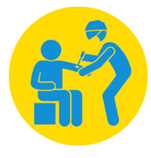
In Partnership with CSL Behring
Clinical trials for transplant recipients evaluate different types of potential treatments in individuals who are waiting for or have already received a transplant. These studies may examine new anti-rejection and anti-infection drugs, new approaches to surgery, or new combinations of treatments.
The goal of clinical trials is to gain knowledge and understanding whether potential study treatments can safely and effectively meet certain study criteria, such as prolonging life expectancy, prolonging survival of the transplanted organ(s), improving a person’s quality of life, and improving current medications.
What is the Process to be Accepted for a Kidney Transplant Clinical Trial?

Prior to being accepted to a clinical trial, you will be screened to make sure that you qualify for the trial based on inclusion and exclusion criteria.
- Eligibility criteria means that to participate, you must meet specific requirements.
- Exclusion criteria means you must not have other specific reasons that would prevent you from participating in a trial.
If accepted into the trial, the first visit consists of required testing, such as cognitive and/or physical tests. If the study is a randomized controlled trial (RCT), you will be randomly assigned to a treatment or control group. The randomization process determines:
- who receives the medication or procedure (treatment group)
- who receives a placebo or standard procedure (control group).
Randomization is usually done by a computer program. Randomization may be blind, which means that the doctor (PI) and/or the study coordinator may or may not know what study therapy the participants receive.
Deciding Whether or Not to Participate in a Clinical Trial

Before you agree to participate in a clinical trial, an investigator and/or a study coordinator will explain to you in detail:
- the goals and purpose of the designated clinical trial
- the plan and methods for any required visits and tests
- the possible side effects of the tested agent that you may experience
- how participation in the study might affect your daily life
- how your transplant might be affected by or without the treatment
- and what is expected to happen to you and your transplant during the clinical trial itself and predictably afterwards.
During this initial discussion about the trial, you will have the opportunity to ask any questions that you might have about the clinical trial, including the potential results and any concerns about complications. The research team will give you an “informed consent form” that explains the details of the clinical trial, including known risks and side effects and their potential severity. You will be informed about the voluntary entry and exit from the study, the process of being in the study, and reasons why you may need to be removed from the study. You may also review and share this form with your doctor, care partner, or family, when deciding if enrolling in a clinical study is right for you.
If you decide to take part in the clinical trial, you will sign the informed consent form in the presence of someone from the study team. This will likely be either the principal investigator (PI) of the study or your primary transplant physician, depending on how the study is set up. After you sign the informed consent form, you can change your mind and withdraw from the clinical trial at any time, and for any reason or no reason at all, either before or during the trial. Deciding not to be in a clinical study, or leaving a clinical study at any time will not jeopardize your medical treatment you would otherwise receive.
What to Expect During a Clinical Trial

Throughout the trial, trial participants must report any issues or concerns to the research team. There will be regularly scheduled visits for evaluations, testing and discussions. Some follow-up visits may also be conducted by video or telephone. During these visits, the research team collects information about the effects of the treatment and reviews each participant’s health and safety. When the trial concludes, you will no longer have scheduled visits and testing specifically for the study, but you may continue to be seen regularly by the doctor or PI of the trial. Furthermore, you will no longer receive the treatment being studied after the trial, unless explicitly allowed.


